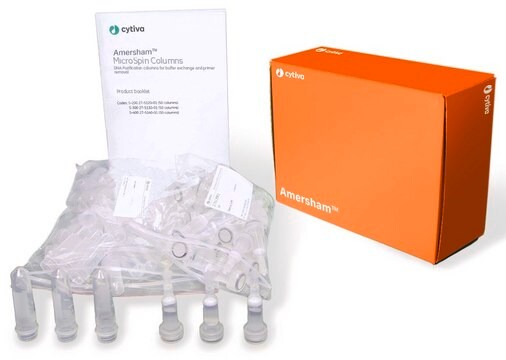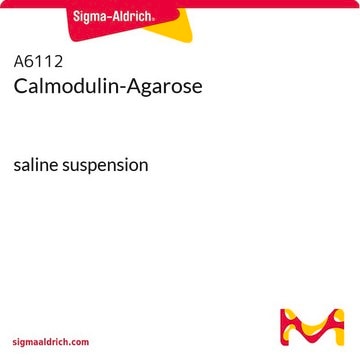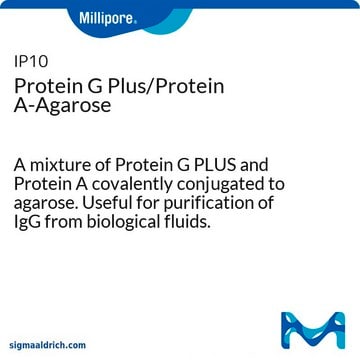U5632
Ubiquitin−Agarose
saline suspension
Se connecterpour consulter vos tarifs contractuels et ceux de votre entreprise/organisme
About This Item
Produits recommandés
Forme
saline suspension
Niveau de qualité
Ampleur du marquage
7-15 mg per mL
Technique(s)
affinity chromatography: suitable
Matrice
Fast flow highly cross-linked 4% beaded agarose
Espaceur de matrice
6 carbon
Température de stockage
2-8°C
Application
Ubiquitin-agarose is used in affinity chromatography, protein chromatography, intracellular protein degradation, calpain and lysosomal proteases, proteomics, specialty resins and ubiquitination analysis. Ubiquitin-agarose has been used in a study to produce evidence for a particulate location of ubiquitin conjugates and ubiquitin-conjugating enzymes in the rabbit brain. Ubiquitin-agarose has also been used to study fertilization of the ascidian, Halocynthia roretzi.
Forme physique
Suspension in 1 M NaCl containing 15 Mm Sodium azide.
Code de la classe de stockage
10 - Combustible liquids
Classe de danger pour l'eau (WGK)
WGK 3
Point d'éclair (°F)
Not applicable
Point d'éclair (°C)
Not applicable
Équipement de protection individuelle
Eyeshields, Gloves
Certificats d'analyse (COA)
Recherchez un Certificats d'analyse (COA) en saisissant le numéro de lot du produit. Les numéros de lot figurent sur l'étiquette du produit après les mots "Lot" ou "Batch".
Déjà en possession de ce produit ?
Retrouvez la documentation relative aux produits que vous avez récemment achetés dans la Bibliothèque de documents.
M Majetschak et al.
European journal of biochemistry, 255(2), 482-491 (1998-08-26)
Ubiquitin is often implicated as a specific tag for protein degradation via the ubiquitin system although only a limited number of physiological proteins have been shown to be degraded in their native tissues via this pathway in vivo. Ubiquitin may
A Ciechanover et al.
The Journal of biological chemistry, 257(5), 2537-2542 (1982-03-10)
We have previously described an enzyme that activates ubiquitin, the heat-stable polypeptide of the ATP-dependent proteolytic system from reticulocytes (Ciechanover, A., Heller, H., Katz-Etzion, R., and Hershko, A. (1981) Proc. Natl. Acad. Sci. U. S. A. 78, 761-765). It carries
Shin-Chung Kang et al.
The Journal of pathology, 203(1), 603-608 (2004-04-20)
Although the key event in the pathology of prion diseases is thought to be the conversion of cellular prion protein (PrP(C)) to the protease-resistant scrapie species termed PrP(Sc), the factors that contribute to neurodegeneration in scrapie-infected animals are poorly understood.
Anjali Joshi et al.
Traffic (Copenhagen, Denmark), 9(11), 1972-1983 (2008-09-27)
Retroviral Gag polyprotein precursors are both necessary and sufficient for the assembly and release of virus-like particles (VLPs) from infected cells. It is well established that small Gag-encoded motifs, known as late domains, promote particle release by interacting with components
Hyoung Tae Kim et al.
Methods in molecular biology (Clifton, N.J.), 832, 639-652 (2012-02-22)
The biological role and fates of ubiquitin (Ub) conjugates are determined by the nature of the ubiquitin chain formed on the protein. Recently, we reported that Ring-finger and U-box ubiquitin ligases (E3s), when functioning with different E2s, synthesize different types
Notre équipe de scientifiques dispose d'une expérience dans tous les secteurs de la recherche, notamment en sciences de la vie, science des matériaux, synthèse chimique, chromatographie, analyse et dans de nombreux autres domaines..
Contacter notre Service technique








